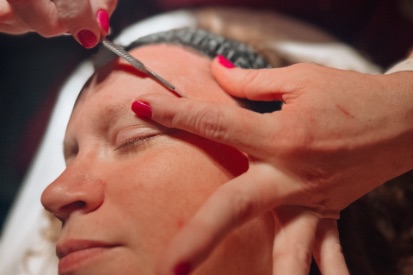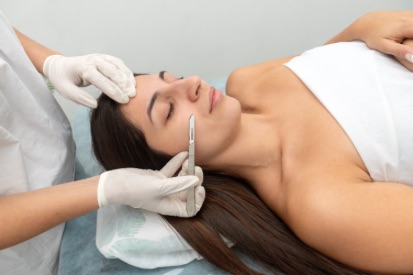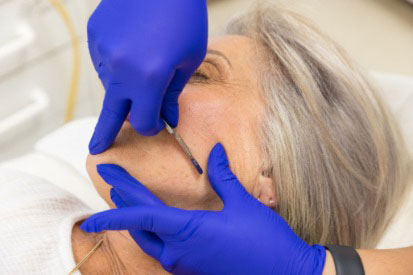Dermaplaning
Experience Smoother Skin with Dermaplaning at Riva Dermatology
Dermaplaning is a gentle, non-invasive treatment that involves the precise exfoliation of the skin's surface using a sterile surgical scalpel. This process effectively removes dead skin cells, peach fuzz, and surface impurities, leaving your skin noticeably smoother and more radiant. By clearing away this outer layer, dermaplaning enhances the absorption of skincare products, leading to better results. Additionally, it provides a perfect base for makeup, giving your complexion a more even and polished look.
Ideal for most skin types, dermaplaning delivers immediate results with minimal downtime. It also helps diminish the appearance of fine lines, acne scars, and uneven skin tone.
Our experienced skincare professionals at Riva Dermatology perform this procedure with the utmost precision and care, ensuring the best possible outcomes for your skin's health and appearance.
Dermaplaning Examples



Benefits of Dermaplaning
- Exfoliation: Removes dead skin cells for a smoother complexion.
- Peach Fuzz Removal: Eliminates fine facial hair for a smoother appearance.
- Enhances Product Absorption: Improves the efficacy of skincare products.
- Brightens Complexion: Reveals a more radiant and even skin tone.
- Makeup Application: Creates a flawless canvas for makeup.
- Non-Invasive: Gentle procedure with minimal discomfort.
- Instant Results: Immediate improvement in skin texture and appearance.
- Stimulates Cell Renewal: Encourages the growth of new, healthy skin cells.
Common Side Effects of Dermaplaning
- Redness: Temporary redness post-treatment.
- Sensitivity: Skin may be more sensitive initially.
- Risk of Nicks: Minimal risk of small cuts or nicks.
- Sun Sensitivity: Increased sensitivity to sunlight.
- Rare Breakouts: Some individuals may experience breakouts.
- Exfoliation Sensation: Skin may feel more exfoliated.
- Tingling: Mild tingling sensation during and after.
What to Expect at Your Dermaplaning Appointment
Following dermaplaning, your provider may apply soothing skincare products, and you can expect to leave with smoother, more radiant skin. It's advisable to avoid direct sun exposure immediately after the treatment and apply sunscreen for protection.
Dermaplaning Maintenance Recommendations
- Gentle Cleansing: Use a mild cleanser to cleanse the treated area without harsh scrubbing.
- Sun Protection: Apply broad-spectrum sunscreen to shield the skin from UV damage, especially in the days following dermaplaning.
- Avoid Harsh Products: Refrain from using abrasive skincare products or treatments that may irritate the freshly exfoliated skin.
- Regular Moisturizing: Keep the skin hydrated by applying a gentle, non-comedogenic moisturizer regularly.
- Avoid Direct Sun Exposure: Minimize sun exposure, and if unavoidable, wear protective clothing and sunscreen.
Dermaplaning Maintenance Schedule
- Initially, frequent sessions may be recommended, possibly every 3 to 4 weeks, to achieve desired results.
- As skin health improves, maintenance sessions may be spaced out, occurring every 4 to 6 weeks.
- Depending on individual needs and preferences, some individuals may opt for ongoing maintenance sessions every 6 to 8 weeks to sustain the benefits of dermaplaning.
Dermaplaning FAQs
Dermaplaning is generally safe for all skin types, including sensitive skin. However, individuals with active acne may need to postpone treatment.
A typical dermaplaning session lasts about 30 to 45 minutes, making it a quick and convenient procedure.
No. This procedure does not biologically alter the hair itself. The main structure of the hair does not change and cannot be altered by dermaplaning. Fine, light colored hairs, when cut or removed, will grow back the same thickness, shape, and color.
Dermaplaning can be performed every 4 to 6 weeks. Treating the skin in this manner actually removes about 2 to 3 weeks’ worth of dead skin cells. The skin should be allowed to complete its normal skin cycle of approximately 30 days
Our staff may recommend this treatment to prepare the skin for medical procedures such as laser treatments or chemical peels. Individuals who have extra photodamage can enhance the cosmetic outcome by layering dermaplaning with a chemical peel. A chemical peel done immediately after dermaplaning is an excellent way to provide for a more even penetration of the peel and optimize the overall result.
From Our QualDerm Family of Providers: Anti Aging Treatments
How Riva Dermatology Can Help: Effective Dermaplaning Treatments in North Carolina
Schedule your dermaplaning appointment at the nearest Riva Dermatology location today.
Featured Products
Check your local office for current stock!
Check your local office for current stock!


